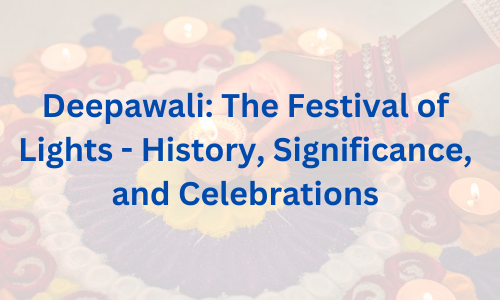
Introduction: Deepawali, or Diwali, is one of the most celebrated festivals in India, symbolizing the victory of light over darkness and good over evil. This festival of lights is celebrated with great enthusiasm by millions of people worldwide, with traditions like lighting diyas, bursting firecrackers, and sharing sweets. But why do we celebrate Deepawali, and what is the significance behind it? Let’s dive into the history, rituals, and ways to make this Diwali safe and eco-friendly.
1. The History of Deepawali: Deepawali’s origin is rooted in ancient Hindu mythology and is celebrated for different reasons across regions:
Ramayana Connection: According to the epic Ramayana, Lord Rama returned to Ayodhya after 14 years of exile and defeating the demon king Ravana. The people of Ayodhya lit oil lamps (diyas) to welcome him back, symbolizing the victory of good over evil.
For more details on the Ramayana and its connection to Diwali, read this detailed article.Krishna and Narakasura: In some parts of India, especially in the south, Diwali is celebrated to mark Lord Krishna’s victory over the demon Narakasura. This story symbolizes the triumph of divine power over demonic forces.
Learn more about this story here.Sikh Significance: Diwali also holds importance in Sikhism, marking the release of Guru Hargobind Ji from imprisonment. This event is known as Bandi Chhor Diwas.
Discover more about Diwali in Sikh tradition here.
2. Significance of Deepawali: Diwali is more than just a festival; it is a time for renewal and reflection:
Spiritual Significance: The festival symbolizes the dispelling of ignorance and the spreading of knowledge and wisdom, aligning with the broader spiritual message of enlightenment.
To understand the spiritual essence of Diwali, check out this spiritual perspective.Cultural Importance: Diwali brings people together, regardless of caste, creed, or religion, fostering unity and cultural diversity. It is a time for families to come together and celebrate with joy.
Read more about the cultural diversity of Diwali here.
3. Rituals and Celebrations: Deepawali is celebrated with various rituals that differ slightly from region to region but share the same essence:
Cleaning and Decoration: It is believed that Goddess Lakshmi, the deity of wealth, visits clean and well-decorated homes during Diwali. People clean their homes, decorate with rangolis (colorful patterns), and light diyas.
For rangoli design inspiration, visit this rangoli ideas page.Lakshmi Puja: On the main day of Diwali, families perform Lakshmi Puja to seek blessings for prosperity and well-being. It is believed that performing this puja attracts wealth and good fortune.
Learn how to perform Lakshmi Puja step-by-step here.Exchanging Sweets and Gifts: Diwali is incomplete without the exchange of sweets and gifts with loved ones. Sweets like laddoo, barfi, and gulab jamun are shared as a gesture of love and goodwill.
Try some easy Diwali sweet recipes here.
4. Eco-Friendly Diwali Tips: While Diwali is a time of joy, it’s important to celebrate responsibly to protect our environment:
Say No to Crackers: Firecrackers cause air and noise pollution. Opt for a cracker-free Diwali to contribute to a healthier environment.
For more on the harmful effects of crackers, read this article.Use Natural Diyas: Replace electric lights with traditional clay diyas, which are more eco-friendly and also help support local artisans.
Discover the benefits of using natural diyas here.Opt for Recycled Decorations: Use recycled materials for decorations to reduce waste. Handmade and DIY decorations add a personal touch to your celebrations.
Check out DIY Diwali decoration ideas here.
5. Diwali Around the World: Diwali is not just limited to India; it is celebrated in various countries with their own unique traditions:
In Nepal: Known as Tihar, Diwali in Nepal lasts for five days and includes worshipping dogs, cows, and even crows as part of the celebrations.
Learn more about Tihar and its traditions here.In Trinidad and Tobago: Diwali is a national holiday, and the Indian community there celebrates it with grand processions and cultural events.
Discover how Diwali is celebrated in Trinidad here.In the USA: With a significant Indian diaspora, cities like New York, San Francisco, and Houston witness grand Diwali celebrations, including community gatherings and fireworks.
For more about Diwali in the USA, visit this page.
Conclusion: Deepawali is a festival that transcends cultural and geographical boundaries, bringing light, joy, and hope into the lives of millions. This festival reminds us of the importance of kindness, compassion, and the eternal victory of light over darkness. As you celebrate this year, remember to keep it safe, eco-friendly, and full of love and happiness. Happy Diwali to you and your family!
Comments